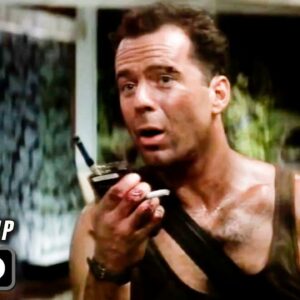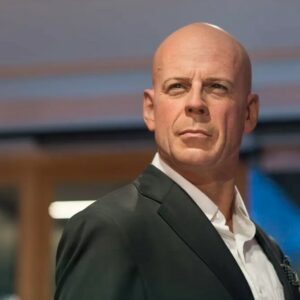Bruce Willis has long been considered one of Hollywood’s most iconic and versatile actors. From his breakthrough role in the hit television series Moonlighting (1985-1989) to his action hero status in the Die Hard franchise, Willis has built a reputation as a leading man who can tackle diverse roles across genres. With over four decades in the business, his career spans a broad range of characters, from romantic comedies to gritty crime dramas to sci-fi blockbusters. His strong screen presence, sharp wit, and ability to embody both hard-edged and vulnerable characters have solidified him as a household name.
Yet beyond the roles he plays, what truly defines Bruce Willis is how he collaborates with fellow actors and crew on set. His approach to filmmaking, whether engaging in lighthearted banter with co-stars or diving into intense scenes with passion, has earned him a reputation as a dedicated and sometimes enigmatic figure in Hollywood. Through the highs and occasional challenges, Willis has maintained his professionalism and formed lasting friendships within the industry, while also navigating tensions and controversies that have, at times, followed his larger-than-life persona.
Collaboration with Fellow Actors
One of the hallmarks of Bruce Willis’s career is his ability to collaborate with a diverse range of actors across a variety of film genres. Whether sharing the screen with Hollywood veterans or up-and-coming stars, Willis has proven himself to be both adaptable and approachable. His collaborations with famous co-stars like Samuel L. Jackson, Milla Jovovich, and Emma Stone reveal much about his ability to connect with actors, adding a unique dynamic to his films.
Willis’s collaboration with Samuel L. Jackson is particularly noteworthy, spanning several films including Die Hard with a Vengeance (1995) and Unbreakable (2000), where their chemistry was undeniable. In Die Hard with a Vengeance, Jackson played Zeus Carver, a sarcastic but intelligent shop owner, while Willis reprised his iconic role as NYPD officer John McClane. The film’s success was largely due to the chemistry between the two actors. Their witty, fast-paced dialogue, paired with high-stakes action sequences, made the movie memorable. Off-screen, Jackson has spoken highly of Willis, emphasizing the ease with which they worked together, describing him as someone who knows how to lead but also knows when to step back and let his co-stars shine.
Another remarkable collaboration was with Milla Jovovich in The Fifth Element (1997). The sci-fi action-comedy directed by Luc Besson saw Willis as the rugged and reluctant hero, Korben Dallas, alongside Jovovich’s ethereal portrayal of Leeloo. The chemistry between the two leads was palpable, and while the film was visually and conceptually ambitious, much of its heart came from the connection between Willis and Jovovich. Jovovich has mentioned in interviews that Willis was supportive and patient with her, especially given it was one of her first major roles. Willis’s ability to help nurture the talent of his co-stars while still delivering a powerful performance of his own is a testament to his skill as a collaborator.
In more recent years, Willis worked with Emma Stone in Red (2010), a film that brought together an ensemble cast of seasoned actors including Helen Mirren, John Malkovich, and Morgan Freeman. Stone, relatively early in her career, played a minor role in the film, but her interaction with the more experienced Willis showed his approachable and lighthearted side. Though their scenes together were limited, Stone praised Willis’s relaxed attitude on set, stating that he was easy to work with and brought a great sense of humor, even during the more serious action sequences.
Professionalism on Set
Bruce Willis’s reputation for professionalism on set is one of the reasons he has remained a top-tier actor for so many years. While his persona can sometimes come off as intense or aloof in interviews, many co-stars and crew members have remarked on his dedication to his craft. Willis is known for being punctual, prepared, and ready to dive into his role, no matter the genre or difficulty of the scene.
His work ethic was especially evident during the production of Die Hard (1988), where Willis performed many of his own stunts. Despite the grueling nature of the shoot, involving physical scenes with explosions and dangerous set pieces, Willis maintained his composure and professionalism throughout. The film’s director, John McTiernan, has spoken about Willis’s stamina and commitment, recalling how the actor would stay focused and work late into the night to perfect his performance. It was this dedication that helped solidify Die Hard as one of the greatest action films of all time.
In other films, such as Looper (2012), Willis’s approach was similarly praised. Rian Johnson, the film’s director, noted that Willis was not only incredibly professional but also willing to collaborate and make adjustments for the sake of the film. In Looper, Willis played an older version of Joseph Gordon-Levitt’s character, and their dynamic onscreen required careful planning and rehearsal to ensure that the two actors portrayed the same character believably. Willis’s attention to detail and willingness to work closely with Gordon-Levitt helped elevate the film’s intricate narrative, earning it critical and commercial success.
Friendships and Bonds Formed
Throughout his career, Bruce Willis has formed many lasting friendships, both on and off the screen. His camaraderie with Sylvester Stallone, particularly in The Expendables franchise, is one of the most well-known. Though their careers have often drawn comparisons, with both actors being action film legends, their relationship has been one of mutual respect and admiration. On-screen, their characters play off each other’s strengths, while off-screen, Stallone and Willis have maintained a friendly rapport. Despite reports of a brief falling out over salary negotiations during the production of The Expendables 3 (2014), the two have since reconciled, showing the enduring nature of their friendship.
Willis has also developed close bonds with other co-stars, such as Morgan Freeman, with whom he starred in Red. Freeman, a Hollywood veteran in his own right, has spoken fondly of Willis, describing him as a down-to-earth and easygoing actor who doesn’t let his fame get in the way of forming genuine connections. The camaraderie between the two actors was evident in their on-screen chemistry, contributing to the film’s success and leading to a sequel in 2013.
Another friendship that has stood the test of time is with Demi Moore, his ex-wife and fellow actor. Despite their divorce in 2000, Willis and Moore have remained close friends and co-parents to their three daughters. Their ability to maintain a healthy relationship post-divorce speaks volumes about Willis’s character and the importance he places on family and friendship, even amid the chaos of Hollywood.
Tensions and Challenges
While Willis’s career has been largely defined by his professionalism, there have been a few instances where tensions on set made headlines. One of the most talked-about conflicts occurred during the filming of Cop Out (2010), directed by Kevin Smith. Smith has been vocal about the challenges he faced working with Willis, describing him as difficult and uncooperative during production. According to Smith, Willis’s behavior made the shoot more challenging than it needed to be, leading to a strained relationship between the actor and director.
However, it’s important to note that not all co-stars and directors share Smith’s perspective. Many have praised Willis for his commitment to his roles and his willingness to work collaboratively, indicating that any tensions he may have encountered on set are the exception rather than the rule. Like any long-standing Hollywood figure, Willis has faced his share of ups and downs, but his ability to navigate these challenges while continuing to deliver memorable performances is a testament to his resilience.
Impact on Film Success
One of Bruce Willis’s greatest strengths as an actor is his ability to form strong working relationships with his co-stars and directors. His adaptability and willingness to collaborate have undoubtedly contributed to the success of many of his films. In action-packed blockbusters like Die Hard, Willis’s ability to connect with his fellow actors adds depth and dimension to the film’s characters, elevating it beyond a standard action flick. Similarly, in ensemble casts such as Red or The Expendables, Willis’s presence enhances the group dynamic, making these films not only exciting to watch but also emotionally engaging.
His collaborations with directors like Rian Johnson (Looper) and M. Night Shyamalan (The Sixth Sense) show how integral Willis is to a film’s success. These films were not only critically acclaimed but also box office hits, largely due to Willis’s ability to immerse himself in his characters and create meaningful connections with those around him.
In the end, Bruce Willis’s career is a testament to his talent, professionalism, and ability to build strong relationships in an industry that can often be cutthroat. Whether forming lifelong friendships or navigating tense moments on set, Willis’s legacy in Hollywood remains one of resilience, versatility, and collaboration. His contributions to the film industry have left an indelible mark, ensuring that his name will be remembered for generations to come.





